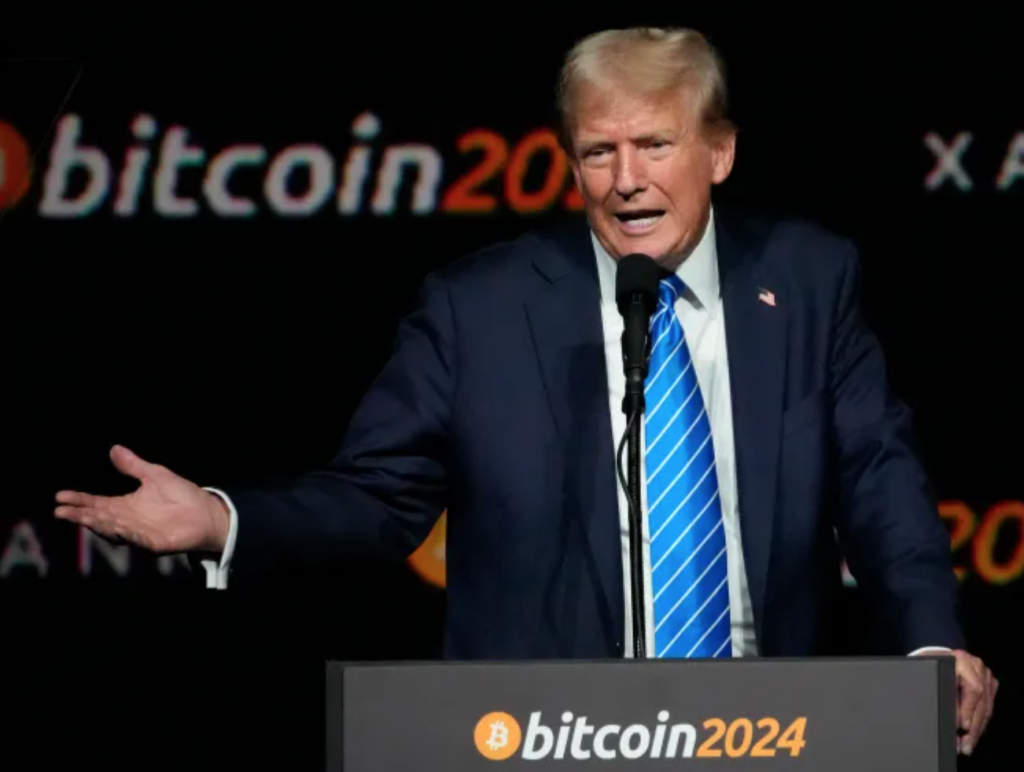The price of Bitcoin surpassed $90,000 for the first time this week, as investors continue to drive up cryptocurrency prices following the 2024 elections.
During the race to the vote, analysts described President-elect Trump as the most crypto-friendly candidate, who during his campaign had promised to make the United States the "world capital of cryptocurrencies" and a "Bitcoin superpower."
In a September note, Geoff Kendrick, an analyst at Standard Chartered, had predicted a surge in the cryptocurrency market in the event of a victory for either candidate, but with a much more positive outlook in the case of a Trump win.
Overall, Bitcoin, the largest and most traded cryptocurrency, has risen by 30% since election night, and cryptocurrency experts say there may still be room for growth in the short term.
"The next price target we're watching is the $100,000 mark," says Federico Brokate, Vice President and Head of Operations in the United States at the crypto ETF company 21Shares. "We believe it's reasonably achievable, frankly, by inauguration day."
Part of the positive momentum in cryptocurrency prices comes from investor optimism about what a government controlled by Republicans could mean for digital assets, says Brokate. However, the long-term prospects for cryptocurrencies would have been the same regardless of who won the election.
"A Kamala presidency would have meant exactly the same things for cryptocurrencies and digital assets in four years, just as a Trump presidency would," says Brokate. "This asset class is completely apolitical, at the end of the day."
Why the current context is favorable for cryptocurrencies:
Part of the recent increase in cryptocurrencies has nothing to do with politics. For example, the decline in interest rates plays an important role, as lower rates typically create a more favorable environment for riskier assets, including stocks and cryptocurrencies.
Additionally, investors continue to flock to the relatively new Bitcoin spot price-linked ETFs. After less than a year on the market, these ETFs now manage around $50 billion in investor liquidity.
However, more forward-thinking investors claim that the current cryptocurrency market is still far from reaching the full potential of investor demand.
According to Andy Baehr, managing director of Coindesk Indices, cryptocurrency investors can be divided into three categories: professionals working in the industry, enthusiasts and traders, and what he calls the "five percent" — retail investors who want to allocate a small portion of their portfolio to cryptocurrencies.
Although the "five percent" have gained much greater access to the cryptocurrency market in recent years thanks to online brokers and the availability of spot ETFs, there is still a long way to go before cryptocurrencies are as easy to own as traditional assets, such as stocks or mutual funds.
"There are still many funds from the five percent that haven't yet entered a Bitcoin ETF, let alone anything else," says Baehr. "There's a huge adoption gap available."
According to cryptocurrency supporters, all of this would be possible if the U.S. government provided a clearer regulatory framework to allow financial institutions to market and sell cryptocurrencies and other digital assets to clients. And this is where some optimism toward a Republican administration comes into play"
The United States should establish a regulatory framework similar to what exists in Europe, known as MiCA — Markets in Crypto Assets. "This framework does a few things really well. First, it focuses on investor protection and the regulation of stablecoins," says Brokate. "Additionally, it creates a framework for the launch and trading of new and existing cryptocurrencies in the market."
Such regulation in the United States could pave the way for financial institutions to offer more crypto products to institutional and retail clients, and for fund companies to start creating diversified cryptocurrency portfolios.
These products are a crucial step in engaging more retail investors in cryptocurrencies, says Baehr, adding that building the regulatory framework for their existence "requires will, priority, focused energy, and investment.












